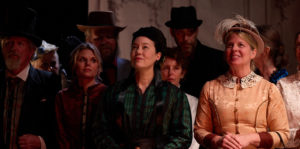
Victoria Lynn Weston’s short film, Free Lover, tells the story of one of the most accomplished women in American History, and at the risk of burying the lead, the first woman nominated for President of the United States.
Before her Presidential nomination, Victoria Woodhull (Christina Leidel) was the first woman to address Congress, the first female stockbroker, and the first woman to start her own publishing company. Guiding her along her prophetic journey to the White House is the visage of the Greek statesman Demosthenes (Travis West), giving her the encouragement only an ancient philosopher could provide.
On the night that Woodhull is to accept the nomination for President of the United States, she is confronted by the crowd on her platform of “free love.” Woodhull takes the Libertarian standpoint that freedom for all Americans also applies in the bedroom. As half the crowd begins to turn on her, Rev. Henry Ward Beecher (Beau Blanchard) decries her friend, saying that free love is an assault on traditional marriage.
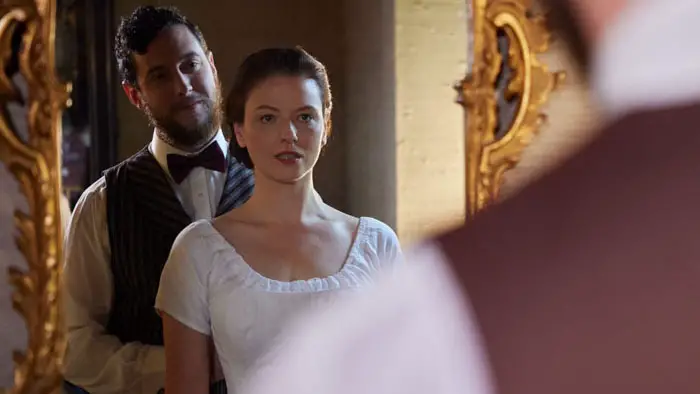
“Woodhull takes the Libertarian standpoint that freedom for all Americans also applies in the bedroom.”
Thus begins Victoria Woodhull’s presidential campaign, where she must defend her views on freedom and marriage while following the instructions of her philosophical and possibly spiritual leader, Demosthenes. Slowly losing support and votes, Woodhull considers calling out her political opponents for their affairs and their hypocrisy.
I’ll be honest. Free Lover is an odd little biography of an unconventional Presidential campaign, and it’s all true. The problem appeared less about Woodhull being a woman and unable to legally vote…for herself. But it’s the fact that she stood on a platform she believed in and a campaign derailed by a single issue.
Free Lover is much more about bringing awareness to this little known figure, whom probably very few people know about beyond feminist circles. It’s a glimpse into how the political sausage is made and how ruthless we become in pursuing power.
It’s a very low-budget production with costumes that fit the period and enough props to make the sets feel like we’re in the proper era. The staging, though, feels like a stage play along with the acting. Ultimately, the story wins out over production values in Free Lover.
For screening information, visit the Free Lover official website.
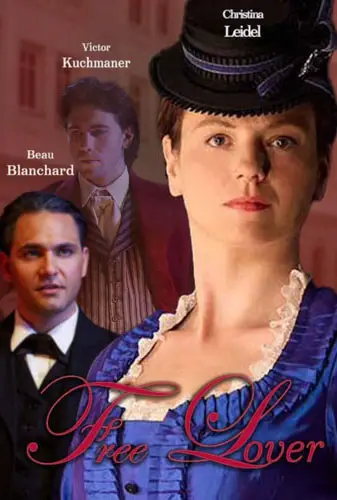
"…she stood on a platform she believed in and a campaign derailed by a single issue."

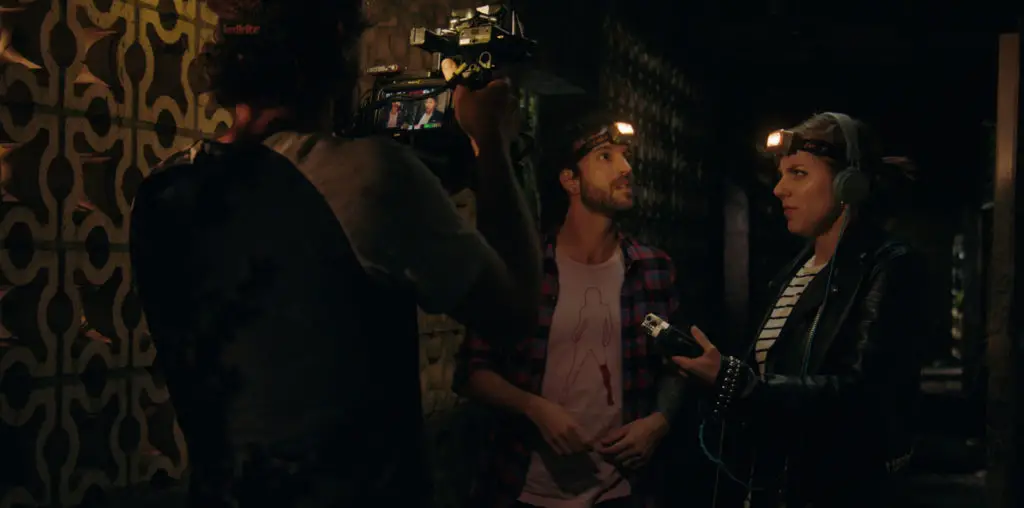
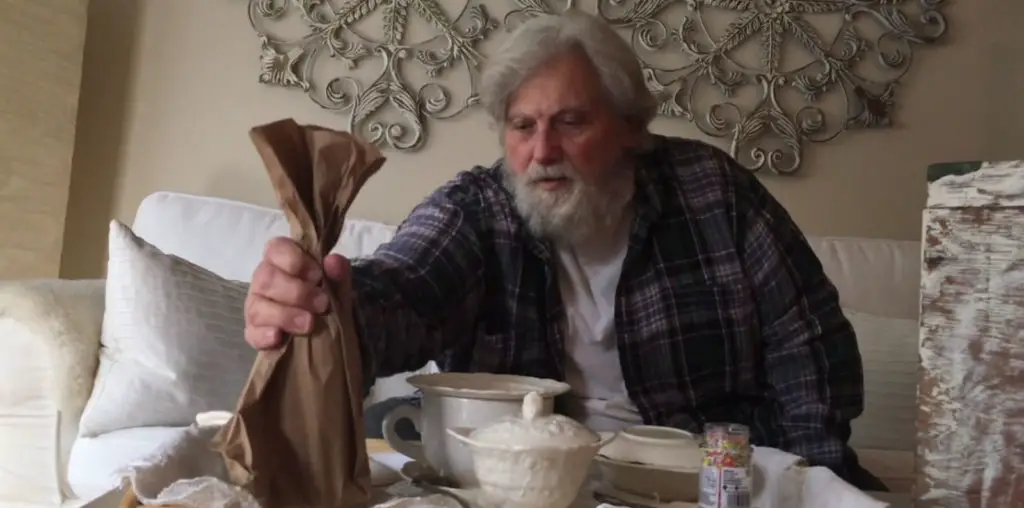
Thank you so much for taking the time to watch my film short, “Free Lover,” I appreciate your interest Victoria Woodhull.
While “Free Lover” is based on my PBS featured documentary, “America’s Victoria, Remembering Victoria Woodhull”, based on factual events and inspired by real-life situations, it is not intended to be a documentary. The film takes a creative approach to storytelling, incorporating elements of facts and artistic interpretation to convey the essence of the subject matter.
I aimed to use the medium of film to explore the emotional and human aspects of the narrative, bringing the characters and their experiences to life in a way that goes beyond the straightforward presentation of facts. This artistic choice allows for a more immersive and thought-provoking experience for the audience.
Indeed, Victoria Woodhull was a trailblazer in many respects. Her courage and determination to be the first woman to address the House Judiciary Committee (with help from General Benjamin Butler) fighting for women’s voting rights, drawing on the 14th and 15th Amendments, mark a pivotal moment in history. It’s fascinating how she utilized legal and political avenues to advocate for equality.
With financial support from Cornelius Vanderbilt, Woodhull’s role as the first female publisher of a newspaper; the Woodhull & Claflin’s Weekly underscores her commitment to providing a platform for her ideas and those of like-minded individuals, including Colonel James Blood and Stephen Pearl Andrews. Woodhull was the first to publish Karl Marx’ “Communist Manifesto” and George Sands’ articles. Furthermore, her groundbreaking foray into the world of finance as the first female stockbroker to own a NYC brokerage company (with sister Tennessee), known as the “Bewitching Brokers” highlights her resilience in challenging traditionally male-dominated spheres. Victoria Woodhull came from nothing, barely educated, and became the first woman to be nominated to run for US President and she craved the bright glare of publicity. She was an ambitious woman and acquired wealth only to lose it all to legal costs from several arrests for violating the Comstock Law – “publishing obscenities” through the Woodhull & Claflin’s Weekly newspaper.
The close relationship between Victoria Woodhull and her sister Tennessee adds a personal dimension to her life story, but my focus in “Free Lover” was on Woodhull and her brain trust of men.
After receiving an inheritance from (son William) from the death of Corneilus Vanderbilt, Victoria Woodhull moved to England, dropped the free love advocacy to reinvent herself as, “a lady” marrying her soulmate, a rich banker, John Biddulph Martin. She continued to lecture and ended her life as “philanthropist.”
Victoria Woodhull is an important historical figure and I do not want her story to fade into the mists of oblivion.
Victoria lynn Weston
Writer/Director – FREE LOVER
“[A]nd it’s all true.” Hardly. After Victoria Woodhull divorced her second husband Colonel Blood, he married my great-great-grandmother. Nanna Blood was incorrectly referred to as the “elderly widow” Fogg in multiple Woodhull biographies. The errors in the biographies set me on the path of a life-long fact checker of Victoria Woodhull related history.
Just to fact check this article:
Victoria Woodhull was not the first woman to address Congress. She was the first woman to address a Congressional Committee of the House of Representatives in 1871. It was the House Judiciary Committee to be exact. Who was the first woman to address Congress is a matter of debate. Anna Dickinson gave a speech to members of the House and Senate in the House chambers in 1864, but it wasn’t part of its official business like Victoria’s. Elizabeth Cady Stanton addressed the Senate Committee on the District of Columbia in 1869.
Victoria Woodhull was not the first woman to start her own publishing company. There were numerous women publishers prior to Victoria. One of the most notable was Mary Katherine Goddard who published the first official copies of the Declaration of Independence. Even if you narrowed it down to a Weekly newspaper that promoted woman’s suffrage, Susan B. Anthony’s “The Revolution” would pre-date Victoria’s weekly.
Calling her “the first female stockbroker” neglects the contributions of her sister Tennessee Claflin who was also part of the stockbrokerage firm, Woodhull, Claflin & Co.
Henry Ward Beecher wasn’t present on the night that Victoria accepted the nomination. Weston took artistic license to compress the timeline and combine disparate events. What really happened: After a spat with Susan B. Anthony in Steinway Hall, Victoria and her supporters headed over to Apollo Hall where the atmosphere was jubilant. “Aye, aye, aye resounded through the hall from every voice, and three cheers for Victoria, with waving of hats and handkerchiefs. Then the whole audience again rose and cheered vociferously, the men waved their hats, and the women shook their handkerchiefs, the uproar being so great that crowed rushed in from the street to learn its cause.” (Woodhull & Claflin’s Weekly, May 25, 1827)
Victoria’s free love views were known to the public about a year prior to her nomination. Her supporters either supported her because of her free love views or despite them.
Of course, when I fact checked someone else, I missed my own typo. It’s “Woodhull & Claflin’s Weekly, May 25, 1872” not 1827. Sorry about that.